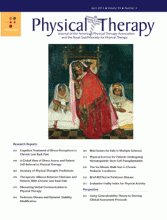Abstract
Clinical assessment protocols must produce data that are reliable, with a clinically attainable minimal detectable change (MDC). In a reliability study, generalizability theory has 2 advantages over classical test theory. These advantages provide information that allows assessment protocols to be adjusted to match individual patient profiles. First, generalizability theory allows the user to simultaneously consider multiple sources of measurement error variance (facets). Second, it allows the user to generalize the findings of the main study across the different study facets and to recalculate the reliability and MDC based on different combinations of facet conditions. In doing so, clinical assessment protocols can be chosen based on minimizing the number of measures that must be taken to achieve a realistic MDC, using repeated measures to minimize the MDC, or simply based on the combination that best allows the clinician to monitor an individual patient's progress over a specified period of time.
- Received September 13, 2012.
- Accepted December 6, 2012.












